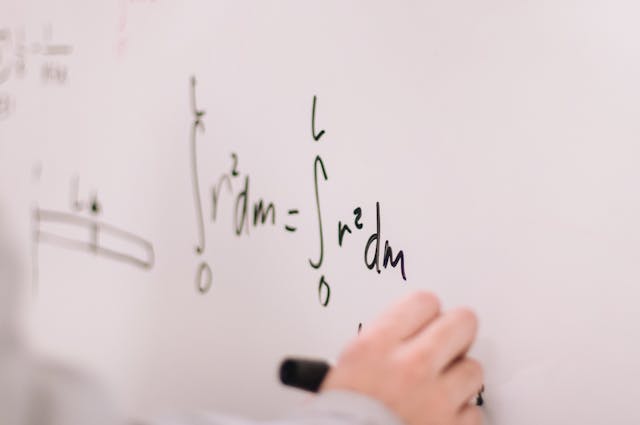
A-Level Mathematics covers a wide range of mathematical topics, providing students with a solid foundation in both pure mathematics and applied mathematics. The syllabus typically includes the following key areas:
- Pure Mathematics:
- Algebra: Manipulation of algebraic expressions, equations, inequalities, and functions. Topics may include quadratic equations, polynomials, exponentials, logarithms, and sequences.
- Trigonometry: Trigonometric functions, identities, equations, and graphs. Students learn about angles, triangles, radians, and applications of trigonometry in solving problems.
- Calculus: Differentiation and integration techniques, including limits, derivatives, rules of differentiation, applications of derivatives (such as rates of change and optimization), and definite and indefinite integrals.
- Coordinate Geometry: Cartesian coordinates, straight lines, curves, conic sections (such as circles, ellipses, parabolas, and hyperbolas), transformations, and geometric properties of shapes.
- Series and Sequences: Arithmetic and geometric progressions, summation notation, convergence tests, and applications of series in mathematics and real-world contexts.
- Proof and Discrete Mathematics: Logic, proof techniques (such as direct proof, proof by contradiction, and mathematical induction), sets, functions, permutations, combinations, and probability.
- Applied Mathematics:
- Mechanics: Kinematics, dynamics, forces, Newton’s laws of motion, moments, equilibrium, motion in a straight line and in two dimensions, projectile motion, and friction.
- Statistics: Data representation and interpretation, probability distributions (including binomial, normal, and Poisson distributions), hypothesis testing, correlation, regression analysis, and sampling techniques.
- Decision Mathematics: Algorithms, graph theory, networks, linear programming, game theory, critical path analysis, and optimization problems.
In addition to these core topics, A-Level Mathematics emphasizes problem-solving skills, mathematical reasoning, and the application of mathematical concepts in real-world contexts. Students develop the ability to analyze problems, formulate mathematical models, and communicate their solutions effectively. Practical applications of mathematics are integrated throughout the course to demonstrate the relevance and utility of mathematical concepts in various fields such as science, engineering, economics, and social sciences.
A-Level Mathematics examinations typically include a combination of multiple-choice questions, short-answer questions, and more extended problems requiring written solutions or proofs. The course aims to develop students’ mathematical proficiency, analytical thinking, and readiness for further study in mathematics or related disciplines at the university level.
